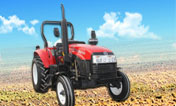資訊中心
 > 新聞中心 >
> 新聞中心 >
Tractors to be exported to Africa, China
“We hope to export 25,000 tractors to these markets as our tractors are 30 percent cheaper than the Indian tractors of similar design and quality,” he said. “We also enjoy the same advantage over China.” He added that it is due to this price advantage that private parties exported our tractors to Afghanistan and the African countries. “Although, the volumes were low,” he said. “Massey Ferguson AGCOB has opened a tractor assembly plant in China, where tractors would be produced from parts made in our factory in Pakistan.” For the African market, they would purchase completely built units, he added. He said that this target is achievable as India, with 30 percent higher prices and inferior quality tractors, is exporting more than 30,000 tractors annually. Localisation of local parts, he added, is around 95 percent for 40 and 50 horsepower (HP) models and 80 percent for 80 HP model. He said that about 50 percent of the parts are produced by 150 Millat vendors, 135 of which are Punjab-based and 15 are located in Karachi. “We produce 45 percent parts in-house,” he said, adding that capital-intensive high-tech parts are developed at the factory and are exported as well. “Last year, we exported tractor parts worth $39,000 to India in the first year and we expect to increase this value and quantity substantially in the coming years,” he said. Khan, who is also the president of Pakistan Business Forum, said that the tractor industry is operating without any government crutches. “We are even denied the customary protective duty allowed to local manufacturers,” he said, adding that the import of tractors in Pakistan is allowed at zero duty. He added that no foreign tractor has been able to make it on roads in Pakistan, which is currently producing around 70,000 units. In fact, he added that this sales volume reached in 2010, but the production suffered due to unclear government policy on sales tax. “Two years ago, there was no sales tax on tractors. Then suddenly the government imposed a 16 percent sales tax on tractors in 2009-10,” he said. “After protests by farmers, the government indicated that it would be abolished as the farmers decided to defer buying.” He added that after more than seven months, sales tax was reduced to five percent, after which sales started. “The government has now increased sales tax to 10 percent, with a plan to increase it to 18 percent by 2018,” he said. “The government should come up with clear policies as uncertainty has an adverse impact on both production and sales.” He said that against 70,000 tractors produced in Pakistan, India is producing 600,000 tractors. “Despite enjoying economies of scale, the cost of production is much higher than that of Pakistani tractors,” he added. According to him, the secret of this success lies in employing best human resource and prudent selection of items for in-house production. “We did not install high-tech machines to produce high-tech critical parts. Instead, we installed semi automatic plants,” he said. “We run our factories on low profits and low overheads.” He added that the localisation level of 80 HP tractors would also reach over 90 percent once volumes cross 15,000 units.
LAHORE: In order to realise the global competitiveness of Pakistani tractors, Millat Tractors Limited’s principal company Massey Ferguson AGCOB has agreed to buy tractors and semi-knocked down parts for exports to Africa and China, Millat Tractors Chairman Sikandar M Khan said.
- 山東瑞澤重工有限公司 版權所有 地址:山東省茌平縣瑞澤重工產業園
 電話:0635-5101888
電話:0635-5101888  傳真:0635-5101999 備案/許可證編號為:魯ICP備19050631號-1
| 技術支持:信息部
傳真:0635-5101999 備案/許可證編號為:魯ICP備19050631號-1
| 技術支持:信息部





